“The Collaborator”
Written by Greg Holland and Ira Steven Behr & Robert Hewitt Wolfe
Directed by Cliff Bole
Season 2, Episode 24
Production episode 40512-444
Original air date: May 22, 1994
Stardate: unknown
Station log: Bareil is having an orb experience. He walks out of the temple onto the Promenade, which is strangely empty—except for the body of a prylar hanging from the railing. Then he sees Kira playing springball. Kira cuts down the body, who is revealed to be Prylar Bek, though Kira says, “It’s you.”
Bareil comes up to the station for a booty call with Kira, which enables him to relax before the election of the new kai. Kira thinks Bareil is a shoo-in, especially since he was Opaka’s personal choice to succeed her. He also promises that he’ll always have time for Kira even if he’s elected kai.
Later they get dressed and go to the Promenade, to find Winn talking to some kids. She and Bareil have a very polite discussion that makes it clear that they well and truly despise each other. Kira also says she’ll be increasing security on the station—not for Winn’s safety, as she assumes, but for Bareil’s, given that the last time she was on DS9, an attempt was made on Bareil’s life. Winn denies responsibility for that (of course), and prays that some day Kira will put all this anger behind her and be Winn’s BFF.
Elsewhere on the Promenade, a Bajoran recognizes Kubus Oak, an elderly Bajoran who worked for the Bajoran Occupational Government, and was exiled as a collaborator. Odo welcomes him home and then arrests him.
Bareil has another orb experience: Bareil is announced as the new kai by Winn, but then Opaka shows up, telling Bareil to be at peace and to be strong. Then Bek appears, handing Bareil a gift from the Prophets: a snake. But when he removes it from the box, it’s a noose.
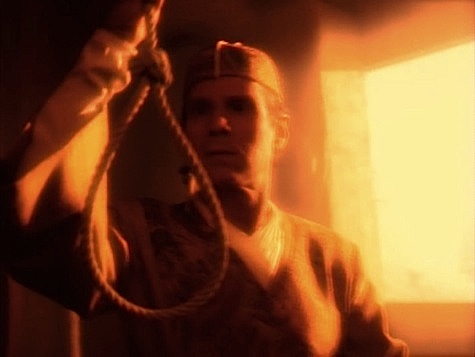
Odo and Kira visit Kubus in his cell. Kubus insists that he and the other Bajorans who worked with the Cardassians—the only recognized government on Bajor, as he reminds Odo—kept things from getting worse. Kubus just wants to go home, but Kira informs him that all members of the Occupational Government were exiled. He can’t go home.
Later, Odo informs Kira that Winn has granted sanctuary to Kubus, after she accessed information on Odo’s computer about Bek—who was also a collaborator. Bek was the liaison between the Cardassians and the vedek assembly, just as Kubus performed the same function for the Bajoran government, and they spent a lot of time together. Winn specifically looked up the Kendra Valley Massacre, during which Opaka’s son was one of dozens killed after Bek revealed their location to the Cardassians—something Bek confessed to in his suicide note.
Winn then demands that Kira allow her ship to depart. Kira insists on a full security check of any ship that departs with Kubus, one that could take days—or even weeks. Winn then reveals that Kubus has new information about the massacre, that Bek was a pawn. His superior is the one truly responsible: Bareil. Kira, naturally, doesn’t buy it—Winn insists she doesn’t, either, but needs to prove it before the elections. She intended to do a quiet investigation, but she wasn’t sure who she could trust to perform it—now, though, she thinks the Prophets have provided Kira. Winn promises to keep Kubus’s accusations quiet if Kira promises to reveal the results of the investigation, no matter what they may be.
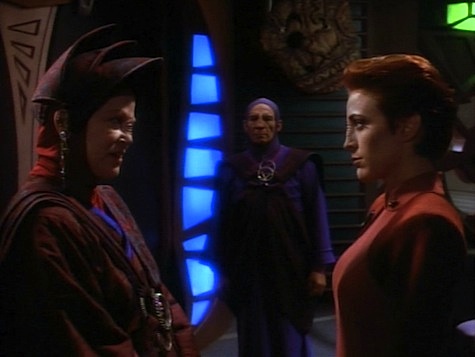
Kira questions Kubus. He insists that Bek wasn’t a collaborator, he was just a messenger, and that Bareil had a long, argumentative meeting with Bek right before the prylar committed suicide. But Kubus’s speculation is just that—there’s no proof, and dozens of reasons why Bareil might have argued with Bek. So Kira questions Bareil, who says he only came to the station to give Bek spiritual advice.
To Odo and Kira’s dismay, all communications between the vedek assembly and Terok Nor in the week leading up to the massacre have been sealed. They then go to Quark, whom they know can get past that seal. Quark is reluctant to do so—“Not only is it illegal, it’s sacreligious”—but he does, only to find that the messages have also been erased. O’Brien can’t retrieve any data in time to do Kira any good, but he does learn who erased the files: Bareil.
Bareil has yet another orb experience: Bek accuses him of betraying him, he gets all smoochy-faced with a naked Winn, Kira stabs him, and he dies in Opaka’s arms. He comes out of the orb experience to find a pissed-off Kira at his temple. Bareil admits that the Cardassians were going to wipe out the entire valley and the only way to save them was to let the Cardassians know where the resistance was hiding out. Forty-three freedom fighters died to save 1200 innocent people.
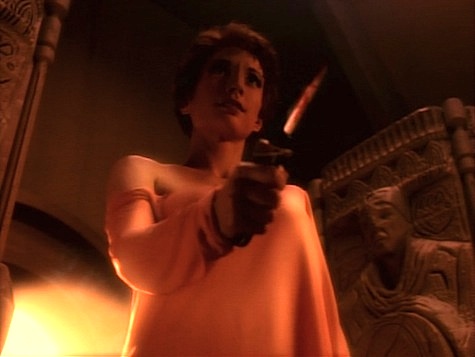
Before Kira can even report to Winn, Bareil withdraws his name from consideration as the new kai, which leaves no real competition for Winn, who is elected. But Kira still thinks something’s wrong, as Bareil would face the consequences, not cover them up.
Then she finds the truth, because he didn’t erase the transit reports, which show he was on a retreat in the week leading up to the massacre. He had no communication while on the retreat, until he was called back after the massacre. Bareil finally admits that he was covering up for the real collaborator: Opaka, who knew where the resistance cell was because her son was part of it. She sacrificed her own flesh and blood in order to save the villagers. And Bareil sacrificed his own ambitions, and let Winn become kai in order to save Opaka’s legacy.
The Sisko is of Bajor: Winn visits Sisko, hoping to mend her relationship with him. She walks back her rather nasty words about the Federation in general and Sisko in particular from “In the Hands of the Prophets.” Sisko sees right through her pretty transparent attempt to create the perception that Sisko endorses her bid to become kai.
Don’t ask my opinion next time: Kira gets put in the awful position of having to prove Bareil’s innocence in a situation where doing so does something far worse.
Rules of Acquisition: Quark quotes the 285th Rule, and also the last one: “No good deed goes unpunished.”
Preservation of mass and energy is for wimps: Odo’s past as the Cardassian security chief comes into play here, as he was present for Bek’s suicide and he knew both Kubus and Bek in passing.
For Cardassia! The Cardassians had a Bajoran puppet government in place during the occupation, with Kubus serving as the liaison between them.
No sex, please, we’re Starfleet: When Kira admits to being in love with Bareil, Odo gets a hurt and surprised look on his face, the first indication that Odo’s feelings for Kira are anything beyond friendly, a subplot that will develop as the series progresses. However at the end, Kira and Bareil are still an item, even after she figures out the truth.
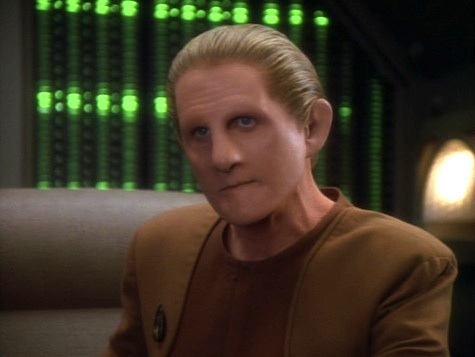
Keep your ears open: “All right, what’s going on? You want something from me, don’t you?”
“How’d you guess?”
“It’s simple: we’ve been here more than a minute and we haven’t insulted him, threatened him, or arrested him.”
“Exactly. So what is it and how much trouble is it going to cause me?”
Quark reading Kira and Odo perfectly.
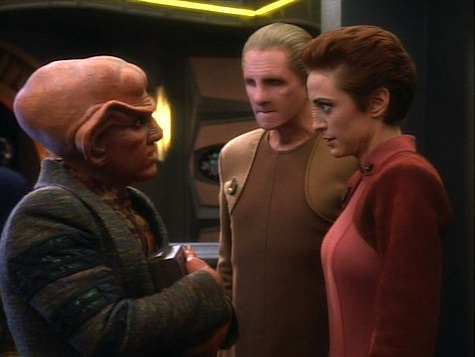
Welcome aboard: Bert Remsen plays Kubus, and Tom Villard plays Bek. Philip Anglim, last seen in “Shadowplay,” is back as Bareil; he’ll return in “Fascination.” Louise Fletcher, last seen in “The Siege,” is back as Winn (and gets to be the new kai); she’ll return in “Life Support.” Camille Saviola, last seen in “Battle Lines,” is back in as an orb image as Opaka; she’ll return again as an orb image in “Accession.”
Trivial matters: Kubus plays a good-sized role in all three Terok Nor novels, particularly the first one, Day of the Vipers by James Swallow, which shows how Cardassia came to occupy Bajor, and in which Kubus is made part of the Bajoran Occupational Government. He also appears in Night of the Wolves and Dawn of the Eagles by S.D. Perry & Britta Dennison; the incident with Bek, Opaka, and Opaka’s son is in the latter book, which names Opaka’s son as Opaka Fasil.
It’s unclear which orb Bareil is using, but given the tenor of the three visions he gets, it’s likely the same Orb of Prophecy and Change that he had Kira experience in “The Circle.”
The writers had been planning to make Bareil the new kai right up until the last minute, when they realized, as Ira Steven Behr put it in the Deep Space Nine Companion, “What the hell good is that going to do us?” The story possibilities with an antagonistic kai were far greater, so Winn was made the new kai. She’ll remain kai until the end of the series.
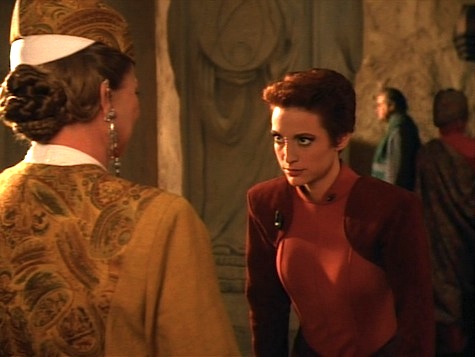
Walk with the Prophets: “If you’re wise, you will never speak to me with such disrespect again!” This is one of those episodes that’s more interesting for what it establishes in the mythos than what it actually accomplishes as an episode. We find out that Opaka condemned her own son to death, the enormity of which was sufficiently great that both Bek and Bareil moved heaven and earth and sacrificed a great deal (Bek more than Bareil, but still) to keep it quiet and preserve Opaka’s position. As has been stated often, Opaka helped hold Bajor together during the occupation, and even the whiff of collaboration would tarnish her forever (as witnessed by the opprobrium leveled at Kubus in the episode). We also get a new kai, and it’s the worst possible choice.
Kubus is actually the most fascinating character in the episode to me, because in the end he’s a tragic figure, a broken old man who just wants to come home. But as soon as Kira confronts him with the enormity of his crimes, he breaks down. He’s an interesting parallel to Marritza in “Duet”—a functionary who was doing the best he could in an impossible situation. But Kubus is less tragic than Marritza, for reasons Kira clearly outlines.
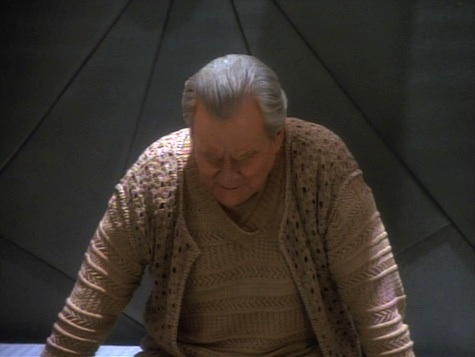
I kinda wish we’d seen more of him, but once he serves his purpose in moving the plot along, he’s dropped like a hot potato. (Where does he wind up living, anyhow?) Mostly spending more time on Kubus would’ve meant less time on Bareil, which would only be to the good. Bareil is our viewpoint character, and focusing on him just shines a light on Philip Anglim’s limitations. His serene act works nicely when he’s being a noble religious authority, but it falls completely flat when he’s trying to be tortured and worried. His blank stare drains the life out of the scene every time he finishes an orb experience, and there’s no emotional content to his performance, cutting off the agony of what he’s supposed to be doing at the knees.
Louise Fletcher remains deliciously evil as Winn, and her sweet demeanor continues to serve her well, as it’s an effective velvet glove—which makes it more effective when she reveals the iron fist underneath it while upbraiding Kira for speaking disrespectfully. Winn isn’t at her best in this episode, but again it sets her up as a magnificent recurring antagonist, the biggest roadblock to Sisko’s goal of getting Bajor into the Federation.
Warp factor rating: 5
Keith R.A. DeCandido will be at the Collingswood Book Festival this coming Saturday 5 October 2013 in Collingswood, New Jersey. Look for him at the Dark Quest Books table (publishers of his “Precinct” series of fantasy police procedurals, including the recent short story collection Tales from Dragon Precinct).










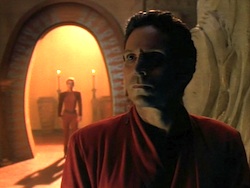
When did Bek commit suicide? I’m confused about that, and the recap isn’t clear. Was it during the episode or sometime in the past, during the Occupation?
As I recall, Odo’s hurt look when Kira said she loved Bareil was an ad-lib by Auberjonois, and the producers looked at it and realized for the first time that Odo had feelings for Kira, and developed that from there.
Bek committed suicide during the occupation, some time during the final four years of it, since Odo was already in place as security chief, and soon after the Kendra Valley Massacre. While they’re waiting for Quark to commit a felony on their behalf, Odo shows Kira the spot where Bek hanged himself.
—Keith R.A. DeCandido
Reading this, I can just hear Winn’s voice. “My child.” She is the most fabulous villain and, in her way, much, much worse than Dukat.
FF
@3 Agree:-) Winn is one of my favorite villians – again and again she almost has you believing she means well, then BAM!
And Keith, you are exactly right about Anglim’s acting, he seems to have only one expression
I’m not sure how I feel about the Odo/Kira insinuation so far. One thing I always enjoyed about their relationship (and enjoy seeing in general) was that it was a good platonic, close male/female relationship. I always had a lot of male friends growing up and it was irritating to see that frowned upon in certain circles or told that (and yes, I was told this once) “Platonic relationships only work with men and women if the woman is ugly”. (The person was not trying to imply that I was ugly, but rather that the relationship was doomed to become complicated/a source of temptation, etc).
Anyway, we’ll see where it goes.
Bareil is still kind of creepy to me in a can’t put my finger on it way, is it wrong that I was hoping he WAS the collaborator, if it would get him off the show, haha?
Tough choices for Opaka…don’t know if I could do it, but at least she could perhaps take some comfort in that (presumably) these freedom fighters would have been willing to give their lives for their people anyway. Not that it necessarily gives her the right to betray them, if you view it that way. But I was just recently in a similar discussion in that kind of morbid vein…using that terrible story of the guy whose kid is playing on the train tracks and he has to switch the tracks or the whole trainful of people plummets off a bridge, but it kills his son. Usually told with some kind of attempt to make an analogy to Christianity, which I can’t stand, because Jesus was not some mindless pawn, but whatever. There are some interesting ethical things to ponder (what if only one person was on the train? What if it were a train of terminally ill people? Or condemned criminals?) but for the most part I hate those kind of no-win, emotionally manipulative thought experiments :P
@5: I’ve had many successful Platonic friendships with women, including a number of women I found stunningly beautiful. I generally would’ve been happy to move beyond friendship if they’d been receptive, but that only once got in the way of the friendship, and to make a long and painful story short, she and I eventually moved past that and became even closer friends.
I wonder why that person said that it had to be the woman who was ugly. What if the woman found the man intensely attractive? Wouldn’t that be just as much of a complication?
I thought this story was rather weak, serving only to install Winn as Kai and move Kira and Bareil’s relationship along a bit. Like Rugal in “Cardassians”, Kubus’s role in the plot is curtailed as soon as the “greater mystery” of who-betrayed-the-resistance is set into motion, which wastes a perfectly good focus character.
Sisko’s conversation with Winn is probably the high point of the episode; Sisko’s all smiles, knowing exactly what Winn is trying to do, almost amused that she’s trying such a transparent bit of political maneuvering on him. Not only is Sisko razor-sharp by himself, he mentored under Curzon Dax for years, so Winn is either incredibly foolish or incredibly desperate to think that it would work. Recently I watched One Flew Over the Cuckoo’s Nest for the first time, and was struck by how similar Louise Fletcher’s best-known characters are – both Winn and Ratched have the same butter-wouldn’t-melt exterior, hiding much darker aspirations just below the surface. And of course she plays both of them so well; they’re characters you love to hate.
Incidentally, I read a great interview with Fletcher, here:
http://www.littlereview.com/getcritical/trektalk/fletcher.htm
(although do note that it was made after the DS9 finale and contains spoilers)
@7: Thanks, CNash. That article you linked was really fantastic. I got a lot out of it.
I’ve always enjoyed this episode, but then I liked a lot of the Bajoran politics stuff.
Anglim wasn’t the best actor, true. Trek seemed to have a pretty hard time casting romantic interests for the regulars in all of the post-TOS series. I wasn’t always completely sold on Kira/Odo, but at least it meant both sides of the relationship were reliably good.
Please tell me I’m not the only one who call Winn ‘Kai Ratched’ ?
Both my wife and I gave an audible groan during the teaser when we saw Bareil was in this episode.
I’ve seen Philip Anglim in two roles: Bariel in DS9 and Dane O’Neil in The Thorn Birds. In both roles, he played earnest, spiritual men, and in both roles he was more of a hole in the energy of the series than the shining star the character was supposed to be. It’s always made me wonder if he’s one of those actors who shines on the stage but just doesn’t understand how to project himself for a camera. After all, the guy won a Best Actor Tony Award for his performance in The Elephant Man on Broadway. Its kind of sad, because Bariel is written in a way that, with the right actor, the character could have been a really compelling love interest for Kira. With Anglim in the role, the words are right but the energy is just wrong. Kind of a shame.
I was afraid it was just me that thought Bariel came across as a little stiff. I rationalized it as him trying to be stoic and solemn, as befits some religious-types, but it makes me feel better that I’m not alone.
critter42 – Kai Ratched? Hahahahahaha – that just made my day!
It will be interesting to see the opinions of the Anglim haters when the rewatch rolls around to season six’s “Resurrection.” #it’sthecharacternottheactor
Oh yeah, I remember what I was going to say about this episode now. I think this episode might have inspired a Weird Al song, because Winn says “infer” when she obviously means “imply.”
#14: I’m not an Anglim hater. In fact, I really wanted to love him in both of these roles, because I loved DS9 and I loved The Thorn Birds. And as a theater buff, having seen the TV run of his Broadway performance in Elephant Man, I was really impressed with him. I wanted great things. But he just didn’t work in these roles.
@14 He’s much better in “Resurrection”, I think. Then again, I think he’s given more to work with there.
crzydroid @15: To my endless annoyance, “infer” used to mean “imply” is officially sanctioned by the dictionary.
In the Nero Wolfe mysteries by Rex Stout, in one story Wolfe burns a dictionary in part because it allows this usage of infer.
@18: Dictionaries don’t allow or sanction anything. All a dictionary is is a record of how people use words, it is not an authority nor is it meant to be one. It describes usage, and that’s all it does. And if people use a word a certain way and a dictionary doesn’t mention it because of some hang-up on there being some magical “right” definition for a word, then it’s an awful dictionary.
@19 – I definitely accept that language evolves and is a living thing. But at the same time, being very interested in precision and standards and kind of a stodgy person – that post kind of sent shudders down my spine. The world is all higgeldy-piggeldy! :)
I’m late to the re-watching party, but I had to say – I thought Odo was more than a little heavy handed coming down on Kubus, for someone who also worked for the Cardassians during the occupation. I get why Odo would arrest Kubus, having been exiled by law and all, and I get that Odo’s participation in the occupation was nothing like Kubus’s (e.g., no signing off on “death sentence” work orders), but Odo came off to me as sitting an an unjustifiably high horse.
#21/Z
Odo pretty much lives on a high horse (when he isn’t living in some bad 1980s city art sculpture room.)
How the hell does someone just recognize Kubus Oak on the promenade, and not when he boards the station? Do ships not transmit passenger manifests when they dock? Is there any kind of Bajoran immigrations office newcomers have to go through? Passports? Yes, he could be travelling under a fake name, but still…
As for where does he end up living, Winn probably gives him a pardon and a nice place to live his last years.
@23/lordmagnusen: I would think that any records of the identity of collaborators would’ve been wiped by the Cardassian government or lost in the Withdrawal. So only someone who recognized Kubus from personal experience would’ve been able to identify him. I think there have been similar cases with Nazi war criminals.
Yeah, youré right about that. Still, it bothers me that there’s never much mention of any kind of Bajoran immigration authority on the station. People just dock, and walk out into the promenade. :) (Except for cargo, there’s customs for that.)
@25/lordmagnusen: Promenade? Hah! If only it were just the promenade. How many episodes have non-senior officers just waltzing into Ops? How many times do they beam strangers into Ops without any apparent security? It’s nuts!
Hahaha, yes, it’s madness!!!
The script never mentions where Kubus has spent his exile, but it was obviously somewhere in Brooklyn, judging from the accent he picked up.
One thing that really bothered me about this episode is the way Kira and Odo march into the bar and railroad Quark into breaking the law. As they point out, their relationship with him consists of threats, insults and arresting him. Kira’s attitude to Ferengi in general borders on racism and she has claimed to despise him as a collaborator. So why, exactly, should he be expected to do them a favour and an illegal one at that? His comment about taking the fall for them is essentially true.
If Odo and Kira can spend two series chasing after him for breaking the law, why is it suddenly okay because they want something? Why is the law optional for the main characters as long as they’re not Quark?
I found it really hard at times to follow the plot. Who betrayed who and which sacrifice was the greatest? I have the feeling that even watching DS9 in it’s entirety won’t change my mind about the show too much.
SPOILER ALERT!
…..
….
…
..
.
It’s sad that Bareil had more charisma as a cyborg in Life Support, than he did as a Bajoran in the previous episodes!
thierafhal: Dude, these episodes aired two decades ago. Spoiler alerts and text-hiding is really not necessary. :)
—Keith R.A. DeCandido
@32. krad: Yes and people still read your re-watch reviews [like me ;) ] and I’ve seen comments from people who have not even seen the episodes. I realize the chance is small that it would actually be a spoiler for anyone and even a smaller chance that anyone would care about Bareil’s fate, but it just seemed prudent considering my comment referred to another episode.
But I mean, sure, if you really don’t think it matters than I won’t waste the time in the future, haha.
I can read the words through the “blackout” thing anyway.
Actually that was intentional. It was only meant to be hard to accidentally read at a glance. If it was a series changing spoiler I would have been more thorough at hiding it.
I don’t think the Bajoran people are given enough credit. Opaka is no longer Kai, and if what she did and why she did it is exposed, wouldn’t it just elevate her? She made a huge sacrifice to save (some of) her people. Bareil is too noble to allow her memory to be tarnished, but it would be better for Bajor if he became Kai. But not for the writers, alas.
And in this episode, Bareil is showing signs of a serious Orb addiction..
@36/fresnel: I’ve always thought the same way. Opaka made a tremendous sacrifice to save the villagers and I have to think that there’s no way she could not have been elevated. However, I think it’s precisely why she didn’t want the truth revealed. What she did, she didn’t do it for recognition, she did it because it was her duty to save the lives of 1200 innocent people. And it was Bereil’s duty as a Vedek to acceed to her wishes. Not only because she was the Kai, but also because a Vedek is sworn to secracy if he is told something in confidence.
@fresnel / @Thierafhal “Opaka is no longer Kai, and if what she did and why she did it is exposed, wouldn’t it just elevate her? ”
If that’s the only time Opaka passed information to the Cardassians or assisted them for the sake of the needs of the many, then sure it would elevate her. But was it the only time, or did she make other sacrifices? That’s the first question the Bajorans would ask, and the last thing the Bajorans faith and government would want asked. Especially as we know the Cardassians destroyed records before they left Bajor, and we see members of the hierarchy were prepared to do the same to cover Opaka’s tracks. Call Opaka’s integrity into question, and it may not be possible to exonerate her.
Lockdown Rewatch. Whilst agreeing with the main review on Philip Anglim, one of the Characters that was most poorly cast in DS9, I like this episode, it’s a scene setter for further conflicts to come yes, but it’s also well plotted and Anglim aside well acted, I didn’t originally see the Opaka twist, I did think Bareil had betrayed the cell to save the civilians from retribution until the last moment. The highlight of this episode is of course another Stellar performance from Nana Visitor continuing to cement her place of one of the best actors in Trek history, Rene Auberjonois matches her all the way in their scenes together and the Avery Brooks , Louise Fletcher scene is also one the highlights of the season. The only tick down for this episode was that in a series that was priding itself in as connected storyline they didn’t address how Winn had gone from a Verdek who’s “voice was little listened to” at the start of the season to Kai at the end is somewhat disappointing, it would have only taken a line of dialogue between Kira and Sisko to clear it up. Nevertheless I would give this a strong 7 out of 10.